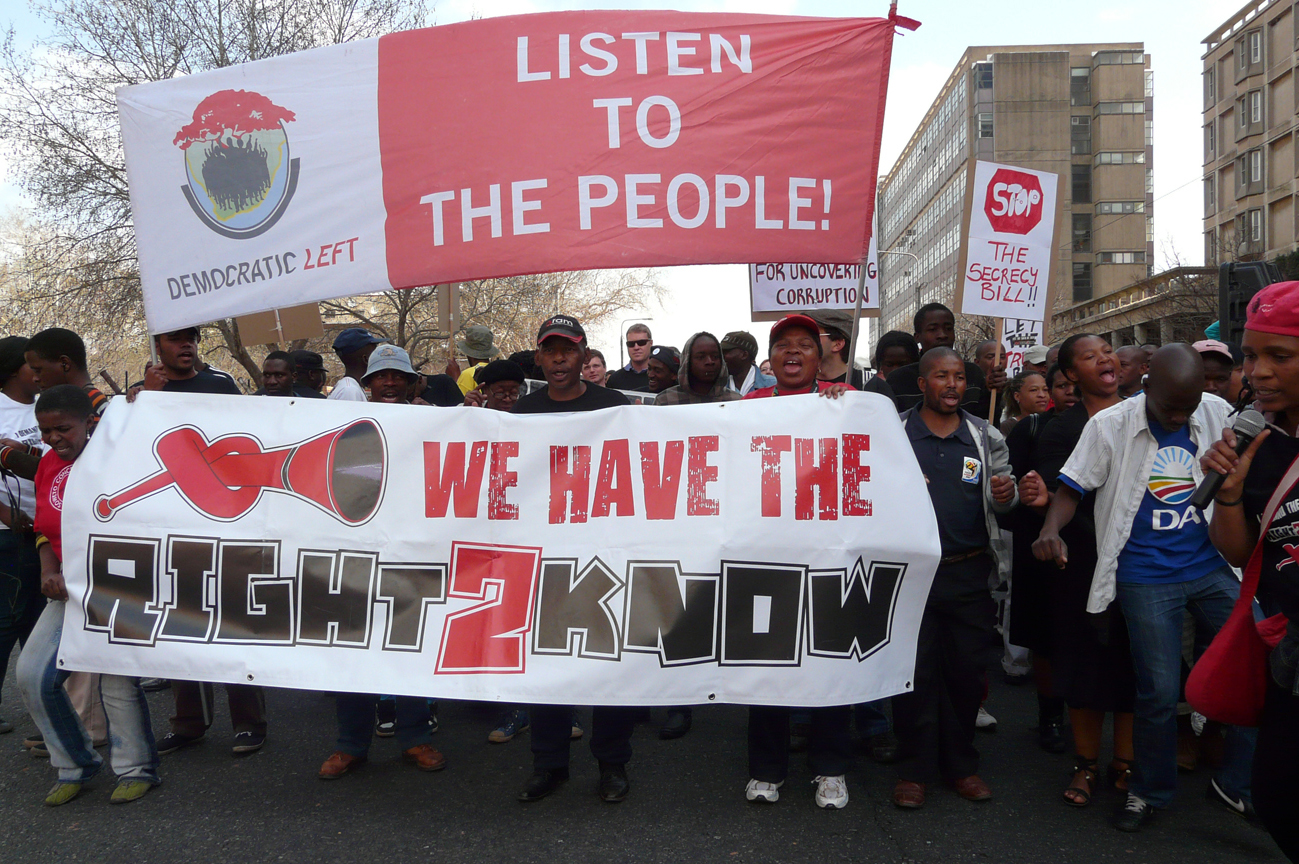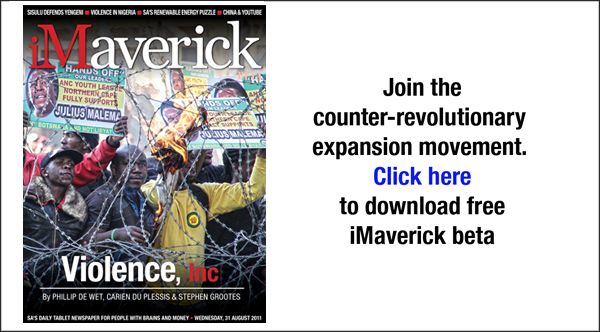The stature Right2Know has gained in civil society in South Africa in the past year makes it seem a lot older than a mere 12 months. But then, there's been a lot of work to do. “The initial impetus was obviously the (Protection of Information) bill, and it was really a group of concerned individuals – some in NGOs, social movements, academics, journalists – who wanted to have a public presence and a public voice on this,” says Right2Know Gauteng spokesman Dale McKinley.
“For the first three months it really was just that sort of smaller group of individuals and NGOs and others who came up with the initial statement, and then decided there needed to be some kind of public activity – and that's when (we had) the first march on the Constitutional Court late last year, but it was not an organised structure,” McKinley adds. “There really wasn't anything in the context of offices, elected people, and those sorts of things.”
This changed when Right2Know hosted its first national conference in Cape Town in January. A national structure was established and working groups set up. Resolutions were also passed on all the key issues the Right2Know campaign ended up adopting. Right2Know has seven demands it wants to see reflected in the Protection of Information bill:
1. The bill should apply only to core state bodies in the security sector such as the police, defence and intelligence agencies.
2. Even then, the bill’s powers must be limited to strictly defined national security matters and no more. Officials must give reasons for making information secret.
3. Exclude commercial information from this bill.
4. Do not exempt the intelligence agencies from public scrutiny.
5. Do not apply penalties for unauthorised disclosure to society at large, only those responsible for keeping secrets.
6. Do not criminalise whistleblowers and journalists: the bill must protect those who release classified information if that information is in the public interest; and
7. An independent body appointed by Parliament, and not the minister of state security, should be able to review decisions about what may be made secret.
The Ad Hoc Portfolio Committee on the Protection of Information Bill's extended deadline is to 23 September, but, so far, none of these demands has been fully met in any of the several drafts through which the bill has gone. Right2Know continues to apply public pressure, and on Monday published a detailed explanation of "why the secrecy bill still fails the freedom test”.
National Right2Know co-ordinator Murray Hunter sent Daily Maverick an update on the proceedings in Parliament on Tuesday evening, stating that the issue of a public-interest defence hadn't been discussed, but that the ANC has dug its heels in on the bill trumping the Promotion of Access to Information Act, as well as the fact that “state security matter” will still have a broad definition. Hunter is not expecting much to change. “I don't see a radical climb down on the matter,” he said.
Right2Know has always been clear on what the next step will be if the Protection of Information bill in its current form becomes law. “We'll move, unfortunately, to the next step, which would be a potential legal challenge to the bill,” said McKinley. “And we're not the only ones who've said that. Cosatu has made it quite clear it’s considering that as well. That's not the only option we'll have, just the most immediate option to test its constitutionality.”
But, while the potential passage of the bill is its current rallying point, Right2Know isn't a one-issue campaign. “The right to know is broader than just one piece of legislation,” says McKinley. “There are serious problems across the country, irrespective of the legislation – the practice of people getting hold of information they need is being stymied.” With this in mind, whatever happens with the bill, Right2Know will continue to push the agenda and work towards creating a much more open society. “Fundamentally this campaign is about democracy, accountability, and transparency in the public sector, but also the private sector and Paia applies there as well,” McKinley says. “There would be plenty of work to do.”
And Right2Know has positioned itself well to continue this work. In its year-long history, more than 400 NGOs and 20,000 individuals have endorsed the campaign. One the biggest achievements so far has been the manner in which it's brought together organisations and people from across society. Right2Know supporters transcend class, race and ideological boundaries to rally around an issue; it's decidedly not an organisation restricted to the chattering classes. “We started having a whole range of activities within communities – so taking it down, instead of just having a central meeting somewhere in urban areas,” says McKinley. “(We're) beginning to explain Paia and the secrecy bill and its relevance. We heard testimonies from communities about how the lack of information affected their lives, around service delivery and accountability... and we integrated those into the campaign. Our critique of the secrecy bill and the lack of information begin to relate to the real day-to-day struggles of people.”
In the spirit of engagement, it's not only communities that Right2Know has been working with; it has approached the government too. “We've done quite a bit in engaging official structures – public and government officials,” says McKinley. “It's not simply a matter of just criticism, and saying 'we want this, we, want that'. It's about trying to create avenues for engagement.”
Hunter is effusive on the manner in which usually disparate social groups have begun working with each other on the campaign. “When I see the momentum that's been created around the Protection of Information Bill, I want to find minister Cwele (Siyabonga Cwele, the minister of state security), and give him a big kiss on the cheek, because he's united us," Hunter says. “The way that ratepayers in Constantia sit at the same table with unionists (and) radical anti-state people... we're rallying together. It's magical. The bill is a symptom of the much bigger struggle to access information, to share information, that cuts to the ideal of an open democracy.
“A lot of people are asking now: 'Are you going to win on this bill? Are you winning or are you losing?', and the overwhelmingly positive message that's coming out is we've already won in some ways,” Hunter continues. “Maybe it goes to the Constitutional Court, but in a broader sense, civil society has already won. South Africans are rallying around open democracy. I feel that there's a moment here.”
But Hunter isn't stuck in the moment: with the committee's deadline fast approaching, there's no time to pause. Although the deadline is officially on 23 September, he says: “[W]e're suddenly mindful of the fact that they might be pushing to take it to the national assembly before 15 September. I do think this is going to happen before Parliament rises on the sixteenth.” Right2Know had been planning a march in Cape Town on 22 September, but this will probably be brought forward. “Sometime in September,” is all Hunter is able to commit to right now.
Reflecting on Right2Know's “birthday”, McKinley says: “It's good that we've been around for a year, but I don't think we're thinking so much about that. All eyes are on the bill because that's going to be our big fight. We've been able to mobilise quite a few opinions and squarely put this on the national agenda. We've achieved a lot, but there's a hell of a lot more that needs to be done, depending on the outcome of the bill. We'll hopefully be up to the task.” We hope so too. DM
Read more:
Photo: Right2Know march to the Constitutional Court on Saturday 12 August. Theresa Mallinson, for Daily Maverick.





